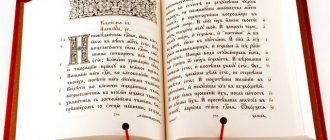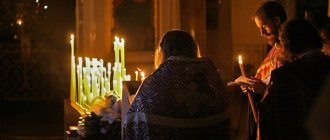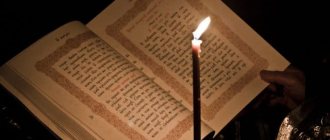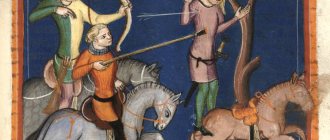Prayer text
The prayer “Lord, have mercy,” the text of which has several variations, is one of the most frequently used by Orthodox Christians. Often a short version or Russian translation is used. And the official Church Slavonic text looks like this:
In the name of the Father, and the Son, and the Holy Spirit. Amen.
Glory to Thee, our God, glory to Thee. Heavenly King, Comforter, Soul of truth, Who is everywhere and fulfills everything, Treasure of good things and Giver of life, come and dwell in us, and cleanse us from all filth, and save, O Good One, our souls.
Holy God, Holy Mighty, Holy Immortal, have mercy on us (three times).
Glory to the Father, and the Son, and the Holy Spirit, now and ever, and unto ages of ages. Amen.
Most Holy Trinity, have mercy on us: Lord, cleanse our sins: Master, forgive our iniquities: Holy One, visit and heal our infirmities, for Thy name’s sake.
Lord, have mercy (three times).
Glory to the Father, and the Son, and the Holy Spirit, now and ever, and unto ages of ages. Amen.
Our Father, who art in heaven! Hallowed be Thy name, Thy kingdom come: Thy will be done as it is in heaven and on earth. Give us this day our daily bread: and forgive us our debts, as we forgive our debtors: and lead us not into temptation, but deliver us from the evil one.
For Thine is the kingdom, and the power, and the glory, of the Father, and the Son, and the Holy Spirit, now and ever, and unto ages of ages. Amen
The shortest and bottomlessly deepest... About the prayer “Lord, have mercy”
All divine services of the Orthodox Church are imbued with the prayerful cry: “Lord, have mercy.” This is the oldest human prayer. The tradition of the Church tells us that our forefathers, who sinned and were expelled from paradise, began their blessed saving path of repentance, which ensured the possibility of the appearance of the Savior and His redemption of the human race, precisely with this prayerful cry of the soul: “Have mercy!” - “Merciful, have mercy on me, fallen!”
The most sacred Old Testament creations - psalms and prophecies tirelessly repeat this word “have mercy”: “Have mercy on me, O God, according to Your great mercy; pray to God to have mercy on us,” says the holy prophet Malachi (1:9).
The first prayer heard in the first temple of the true God built on earth was: “hear and have mercy” (1 Kings 8:30).
This is the first prayer that an Orthodox child learns; and this is the last prayer that the dying consciousness of the dying person repeats before death. Let us remember the patristic story about the death of the young ascetic, the Monk Dositheos.
And if on calm days, in the quagmire of everyday everyday life, the words “Lord, have mercy” are often indifferently repeated, like a familiar refrain, then in moments when either danger, or torment, or the bright, burning consciousness of the abyss of one’s fall shakes the soul, then this short cry of prayer is suddenly filled with the deepest meaning and power. And like a person condemned to death before a judge, in whose eyes he reads the last possibility of hope for pardon, like a terminally ill person in prayer to a doctor who can save, the human soul begins to cry out to Almighty God: “Lord, have mercy!”
Humanity has made many inspired, bright prayers. But when death looks into the eyes, or when an unbearable fire burns the soul, then a person cannot find the strength in himself to repeat the calm words of prayers, but instead of all other prayers, he cries out “Lord, have mercy,” finding a subsoil foundation in these two words all prayer requests.
Prayer
And when, above all hopes, it turns out that this cry is heard, when the merciful Hand turns away what seems to be a mortal danger or leads the soul out of the seemingly hopeless dead end of despair, then the saved soul comes to love this shortest prayer “Lord, have mercy” with a strong, unbreakable love; already calmly and enlightenedly begins to repeat it in all the light and dark, sorrowful and joyful moments of his life.
That is why Orthodox worship is filled with the refrain “Lord, have mercy.” If Orthodoxy is primarily a religion of repentance, if it is the sanctuary of all humanity and everything that is truly good, valuable, correct in the Universe, wherever it may be, belongs essentially to the Orthodox Church, then of course here, in the Orthodox Church, in the Orthodox In prayer, in its rightful place, in countless prayer repetitions, there should be the most fundamental prayer of humanity: “Lord, have mercy,” both as the cry of a soul seeing itself on the edge of death, and as a calmly joyful, grateful repetition of this prayer, which brought more than hope for salvation.
And the individual, and nations, and humanity so many times stood over the abyss of destruction and were delivered by God’s merciful hand. How can one not repeat countless times: “Lord, have mercy”? How not to repeat these experience-tested saving words now, when to an unprecedented degree, destruction has approached humanity, has taken on clearly tangible forms and is persistently looking into its eyes?
We know, we foresee quite clearly, that this first prayer of the human race, first uttered by the lips of our sinful ancestors in the bitter hour of expulsion from paradise, will also be the last prayer of human lips, when human history ends in fire and storm, in the sounding trumpet of Archangel, and in the trembling of the last, final minutes, human souls will have neither the strength nor the time for any other prayers except this one - the shortest and bottomlessly deep: “Lord, have mercy, have mercy and have mercy!”
Rules for reading the prayer “Lord, have mercy”
There are no specific requirements for reading the prayer “Lord, have mercy.” But there are a number of strengthening or weakening factors. These include:
- Time of day - evening or morning prayer is much stronger than daytime prayer;
- Place of reading prayer - in the temple the effect of prayer is more noticeable than at home;
- Attributes used when reading the prayer;
- Regular communion and confession.
No matter how modern representatives of the church insist that every person should have a religion, faith is still a purely individual matter and comes from the soul. Therefore, prayers must come from a pure heart, without guile. If a person does not feel sin or guilt, then even after reading “Lord, have mercy,” he will not receive the desired forgiveness. Also, prayer from a person who does not consider himself a believer, but has decided to ask for forgiveness from the Almighty just in case, will not have any effect, so to speak, to atone for his sins.
The most ancient
This ancient prayer to God in Greek sounds like “Kyrie eleison!” (Kyrie eleyson!) - and means not only a request for an opportunity to be saved, but also a certain story about oneself before the Creator, regret about one’s own sinfulness and imperfection.
In canonical prayers and services, it is repeated three, twelve or forty times - these numbers mean the trinity of God the Trinity, the 12 apostles and the fullness of the test (Jesus fasted for 40 days).
The Russian saint John of Kronstadt believed that the constant prayer of Jesus, prayer “strikes our pride and evokes... ...a feeling of humility,” and is needed by every sinner, it is “the breath of his soul.” And when a believer often repeats “Lord! Have mercy!”, then he is alive and everything is in order with his soul, but if his lips are silent, then he is dead or near death.
Do the laity need prayer?
All the saints recommended reading the Jesus Prayer to the laity. People can at least partially try its effect on themselves. Another thing is whether it will work or not. It all depends on the person himself. There are several stages of mastering it that the prayer goes through:
- Verbal - read aloud in solitude to hear yourself, train attention, and get rid of distraction.
- Smart - if not alone, but there is an opportunity, pray silently (you can practice simultaneously with the first). Depending on the situation.
- Active - you do everything the same, but increasing your attention, concentration, thoughtfulness in meaning, connecting a repentant and humble spirit, allocating more time to prayer. You have to learn this. Be patient until the skill comes.
You cannot skip steps. First, they master the first, second, third, consolidating and checking whether this is done correctly. At these stages there is nothing dangerous for a layman, but the subsequent stages are practiced only under the supervision of a mentor:
- smart-hearted;
- self-propelled and so on.
Note: Due to busyness, it will not be possible to read the prayer continuously. If you wish, you can find at least a little time to test your strength. Who knows, maybe you are a future saint, and everything will work out (with the help of the Lord, of course).
Conditions for mastering the Jesus Prayer
During prayer, you cannot imagine anyone, draw images, even good impressions and thoughts must be left out of consciousness. Mental silence is necessary. At the first stage, there will always be something distracting, interfering, hindering, yawning, but you learn to keep the Spirit of repentance and humility within yourself, without scattering your mind for any reason. Not right away, but the skill will come. What is needed for this:
- Understand the meaning of each word.
- It is correct to determine the purpose for which you turn to the Lord.
- The possibility of privacy, both physical (especially when you decide to devote a certain amount of time to prayer) and internal (pray even when there is noise around you).
- Gradually strive for consistency.
- Maintain moderation - get tired, leave, distract yourself with other things.
The words of prayer will become a lifesaver always and everywhere: in front of the boss’s office, exams, problems that have arisen, even if you are flying towards an oncoming car, two seconds before the collision you will have time to shout (out loud or in your mind): Lord, have mercy! This is also the Jesus Prayer, an abbreviated version.
Conclusion: The brevity and simplicity of the Jesus Prayer make it accessible to all people. Its power against passions and demons has been tested for centuries. First you learn it - then it itself will teach you, or rather the Holy Spirit abiding in you. An indicator that you are praying correctly is joy, growing love for your neighbors, for people, for God.
Gifts from God
The same Barsanuphius said that the first gift is attention, when the mind already holds on to prayer and is not distracted by vanity, the second gift is prayer within, when all feelings and thoughts are in balance, passions recede, and everything rushes to God. But you need to be careful, because human passions are like dead men in coffins - if you are distracted, they come to life.
Another gift of God is spiritual prayer, when there is no earthly thing left in a person - he is all directed towards heaven. Those who have achieved such prayer are endowed with insight and can see the hearts of people and their souls.
The Mystery of the Jesus Prayer
Secret 1. True faith. The holy apostles said: We preach Christ crucified, that He is the Son of God and has risen. In essence, this is a summary of the Gospel. The Jesus Prayer has the same quality. It contains Orthodox teaching, separating existing heresy (lies). True Christians believe that Jesus is not only a man, He is:
- The Lord, that is, God.
- Christ is the Messiah to whom the prophets testified.
- The Son of God, who always existed (before the creation of the universe).
Secret 2. Repentance. A petition for mercy has been added to the Names of the Lord. A person believes: He who promised salvation will fulfill His word. In the end, we admit that we are sinners - this is a manifestation of humility, without which prayer will not be effective. The main goal of labor is to acquire:
- complete trust in God;
- true repentance (the Holy Spirit reveals sins gradually);
- the desire for humility, instead of pride and vanity;
- Grace, cleansing from passions.
Note: To some extent, similar goals apply to almost all prayers. Why is Jesus considered the strongest? Next, let's look at the main reasons why she is so exalted.
Secret 3. Name. The secret lies in the Name of the Lord.
Returning from the sermon, the apostles told Christ in admiration: In Your Name even the demons obey us! In His Name they healed, put to death (those who hid the value of their property), and resurrected. The Lord Himself promised: everything that is asked in My Name will be given by the Heavenly Father. Secret 4. Continuity. Demons are cunning and deceitful creatures that hate humans.
Every second they wage war against us in order to destroy and plunge souls into hell. Their powers are superior to human ones, but not to God’s. There is a weapon against them - connection with the Lord through prayer. As soon as they “forgot” about God, they immediately became defenseless against evil spirits. So that the enemy does not have time to take possession of us and does not instill his dirty tricks, the Jesus Prayer is read continuously. It becomes a shield protecting from demonic attacks. Since they cannot bear the Name of Christ and run away, the person is cleansed and freed from sins. He subjugates the passions inherent in the soul, not allowing the “occupiers” to control their own hearts.
Note: The Jesus Prayer has many more secrets, but for beginners it is enough to know this minimum in order to understand the purpose of reading it. Why is it needed, and is a Christian ready for it?
Lord have mercy
In the temple we see on the icons the faces of holy people transformed by the Holy Spirit. During the Eucharist, we hear that they commemorate “all the saints who have reverently served God since the beginning of the century,” and who are united by the sacrament of redemption. And we involuntarily recall the words of the Apostle Paul: “Therefore we also, since we are surrounded by such a cloud of witnesses, let us lay aside every burden and the sin that so easily besets us, and let us run with patience the race that is set before us, looking to Jesus, the author and perfecter of our faith” (Heb. 12 :1-2).
They achieved the glory that the halo symbolizes on the icons only at the end of their asceticism, and only a few of them were visibly glorified. The saints must begin with the same thing that we must begin with, namely, with repentance and “casting aside every burden and sin that besets us.”
The decisive beginning was made already in holy baptism, when we promised to deny Satan and stand on the side of Christ. In the sacrament of repentance, that is, confession, we renew our fidelity to Christ, we demonstrate it even in a visible way, kissing the cross and the Gospel - the word of Christ. And yet we feel again and again that “sin takes hold of us so easily.” Even the apostle laments: “I do not do the good that I want, but I do the evil that I do not want” (Rom. 7:18-19).
We know what happens in our inner man, how evil enters and develops in our consciousness and heart. We also feel our powerlessness. We become like a man who is surrounded on all sides by a herd of wolves. What does a person do in this case? He climbs a tree behind him and escapes. This saving tree is prayer, as the Holy Fathers teach.
But what is prayer? According to a simple definition, prayer is the lifting of the soul and heart to God. But it is also said about prayer that it is the science of sciences and the art of arts. That is, it is the simplest and at the same time the most complex matter. Prayer expresses our desire to communicate with God. This desire is a natural manifestation of our love for God and God's love for us. Through prayer we “pour out our hearts to God,” a biblical expression that means that in prayer we express to God our thoughts and feelings of praise, thanksgiving, and worship.
But prayer is not only a form of serving God, it is also an auxiliary means that is given to us to overcome the evil nesting in our inner man. In this sense, prayer is like a special channel through which a person’s call for help goes to God.
Lord have mercy! This is a constantly repeated call for help during worship. It is also a call for help from a person when he watches at the door of his heart and calls on the Lord to drive away the passions creeping inside him. This general and private call for help comes from a sense of our own powerlessness, about which the Lord says: “For without Me you can do nothing” (John 15:5). But it is also firmly based on the belief that the Lord wants to cleanse our hearts as soon as we ask for it. We are branches on the vine - Christ, and every branch that tries to bear fruit, the Lord “purifies so that it may bear more fruit” (John 15:2).
Thus, God's help and our own prayers save us “from the destruction that prevails in the world because of the passions” (2 Pet. 1:4).
What is the Jesus Prayer for?
Ps.
117, 11: They have bypassed me, and in the name of the Lord they resisted them
.
St. Simeon the New Theologian:
If anyone does not unite with the Lord Jesus here on earth, then he will never unite with Him
.
Right John of Kronstadt:
By the grace of God, often one word hidden in the heart strengthens it, makes it adamant towards evil and thus frees it from inner tightness and languor
.
St. Theophan the Recluse:
The most powerful and all-defeating sword for spiritual warriors is the skill of the Jesus Prayer. Prayer is always a sword... But this one, if you get used to it, will be a sword that is constantly turned around and frightens enemies. Start practicing it until you get the hang of it
.
Arseny (Zhadanovsky), bishop. Serpukhovsky:
Constant repetition of the Jesus Prayer and others, spoken with experience, is necessary because this determines our acquisition of an even, peaceful, holy inner dispensation. And since the acquisition of this dispensation should be an ideal for every Christian, then doing the Jesus Prayer is the task not only of monks, but also of every good Christian who is zealous for the salvation of his soul
.
John (Alekseev), schema abbot:
For the unceasing and intelligent-hearted prayer that you strive for, do not dare to ask the Lord - such a state occurs in very few people, “you can hardly find one out of a thousand,” said Saint Isaac of Syria, and such spiritual measure is achieved by grace God for deep humility
.
Vasily (Roslyakov), priest. Optinsky:
The Jesus Prayer is confession. The unceasing Jesus Prayer is unceasing confession
.
Monks' prayer
The Jesus Prayer has several forms: “Lord, Jesus Christ, Son of God, have mercy on me, your sinful servant (name),” and “Lord, Jesus Christ, have mercy on me,” or “Lord, Jesus Christ, our God, have mercy on me, a sinner.” "
Most often, monks say the Jesus Prayer - they repeat it incessantly until their soul and mind rush to God. In rare cases, the elders blessed the laity for such prayer. The elder from Optina Pystyna, the Venerable Barsanuphius, taught that by praying in this way, a person remembers God every second.
He divided the monk’s prayer into four stages: he called the first stage the labor stage, at this stage the person’s mind quickly becomes distracted from the prayer and forgets about it, and then the monk has to use all his strength to repeat it all the time. But even this is useful, since the mind is tuned to repentance.
The second stage is prayer of the mind, intelligent, when a person’s mind, heart and feelings pray, the prayer occurs as if by itself and does not fall silent. Rev. Anatoly (Zertsalov) pointed out that “Our main effort is to enclose our minds in the words: “Lord Jesus Christ, Son of God, have mercy on me, a sinner.”
The third stage of prayer is when it becomes creativity, and an Orthodox Christian can move rocks with his word. Only rare hermits and hermits achieve such prayer. And finally, the fourth stage of prayerful presence before God is a state of mind that is only accessible to angels and almost never to humans. And for each level passed, a person is given a gift from God.
“Lord, through the prayers of those who love me - Have mercy!”
When Anthony of Sourozh was a young priest, he considered himself very smart and very religious.
He was a “perfectionist-A student” - and there is no person more than an inflated excellent student, far from what Father Anthony wanted to become then. Anthony of Sourozh read all the prayers according to the canon - morning and evening, and as befits a priest living in a monastery, and not a layman. This means that he read a lot, too much.
But this is not the worst thing. The worst thing that happened to the future metropolitan was then guessed by his confessor, an old priest.
The old confessor realized that the young student was reading prayers out of fear and that in life he relied only on the fidelity of the canon he scrupulously read.
The confessor asked Anthony of Sourozh -
will he be restless if he does not read his canon “as expected” in the morning or evening?
And seeing the answer in his eyes, he strictly ordered me not to pray at all for exactly one year.
Instead of the prescribed prayers and passages, you only had to say one phrase to yourself morning and evening, but with feeling:
“Lord, through the prayers of those who love me, have mercy on me.”
The elder said that at the same time you need to “turn on your creative imagination” and try to remember those people (both living and dead, because the dead pray in heaven - according to the ideas of religious people) who can remember you kindly, often or once.
This was a difficult test for Metropolitan Anthony of Sourozh.
He easily imagined his mother and grandmother, father and teacher at the gymnasium - but he could not imagine anyone else. It turns out that no one loves him or has ever loved him.
But then things started to improve - one after another, people emerged who could
somehow influence his fate, just by at least once remembering kindly
(this is the simplest prayer).
Having completed the task of not praying “according to rank” for exactly a year, Anthony of Sourozh discovered this new prayer in all its fullness and depth.
Self-analysis technique:
who is “praying” for me?
Pray carefully
But both monks and priests warn self-confident neophytes against constantly performing Jesus’ prayer, since spiritually inexperienced people face many temptations that can lead them to even greater sins than those they have already committed. The most harmless thing can be a serious illness, which will turn the neophyte away from his exploits for a long time.
You can begin the Jesus Prayer only with the permission of your spiritual fathers. For the neophyte, the main thing is to read the morning and evening rules, where the Jesus Prayer occurs more than once, attend church on Sundays, regularly confess, take communion and remember that the short prayer “Lord, have mercy” sometimes contains the whole world.
In the collection “Invented Stories of God’s Miraculous Help,” there is a story by one hieromonk about a miracle that happened to him in the army. He served as a paratrooper and jumped with a parachute, but his parachute did not open.
The soldier’s mother was a believer, and before leaving for the army, he received a prayer from her: the 90th Psalm “Alive in the help of the Above...” written on a piece of paper, which he sewed under the lining. But when the parachute lines got tangled, and the ground was getting closer every second, there was no time to climb for the piece of paper. The paratrooper shouted in fear: “Lord, have mercy!” - and God heard him: at that very moment the lines tightened and the reserve parachute opened its canopy.










